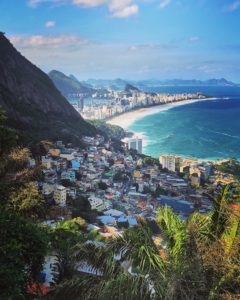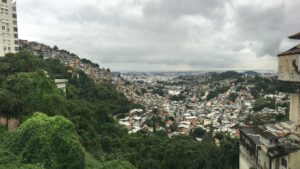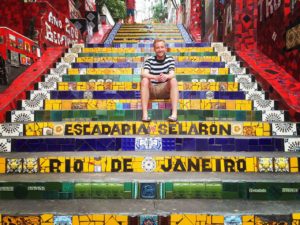Rio de Janeiro, A City of Contradictions
 “A Cidade Maravilhosa”—the Marvelous City. That’s the name that a 1935 traditional Brazilian song gave to Rio de Janeiro, and the city has embodied it ever since. The song goes on to characterize the city as “the heart of my Brazil,” a title which, as the cultural center of the country, Rio has also earned. While the construction of a new, planned city in Brazil’s interior during the 1950’s took from Rio the distinction of being the national capital, its exotic mountains, intricate bay and famous beaches still lead Brazilians to move there from around the country, and tourists to visit from around the world.
“A Cidade Maravilhosa”—the Marvelous City. That’s the name that a 1935 traditional Brazilian song gave to Rio de Janeiro, and the city has embodied it ever since. The song goes on to characterize the city as “the heart of my Brazil,” a title which, as the cultural center of the country, Rio has also earned. While the construction of a new, planned city in Brazil’s interior during the 1950’s took from Rio the distinction of being the national capital, its exotic mountains, intricate bay and famous beaches still lead Brazilians to move there from around the country, and tourists to visit from around the world.
“Cariocas,” as its residents are called, maintain their hard-earned reputation for being fun-loving, active, attractive, and laid back; they encourage arriving 15 to 30 minutes late to lunches, a meeting and even class, and their night life regularly keeps most young people out until 6:00 or 7:00 in the morning. The city apparently holds the record for highest concentration of gyms and beauty salons, at its residents’ bodies are beach ready, year-round. As I’ve come to discover with many aspects of the city, however, a one-sided stereotype often fails to hold. Beyond its beaches, the city hosts a score of museums, office buildings, theaters, universities, and cathedrals. These slightly more serious venues cater to the Carioca who tries to straddle a line between the carefree beauty of the city and the realities of everyday life in Brazil.
Today, those realities press harder than ever. Rising inflation. Political upheaval. A receding economy. Ingrained corruption. The ever-present threat of street violence. The looming Olympics. The Zika virus. Whether due to minor growing pains or more deep-set structural obstacles, current events have removed this once-booming emerging market from its optimistic perch. Despite these near television-worthy circumstances, however, the country keeps moving. While the fear of being assaulted on the street persists at all hours, in all neighborhoods, people still walk. While mosquitos bearing Zika and worse inhabit the skies, locals still dawn their favorite shorts and t-shirt, leaving precious skin exposed. And while TV screens and newspapers recount the unending game of messy, political chess being played in Brasília, people go about their lives, often wistfully laughing off the unbelievable scenario as simply the state of their country’s still-fledgling democracy.
The circus that is the U.S.’s current election season has shifted paradigms and changed the way our nation will continue to conduct politics. We must choose between two widely unpopular options, a presumptive Democratic nominee who is under possible investigation and a presumptive Republican nominee who regularly offends wide swaths of our population. And yet—we don’t hold a candle to Brazil.
The Petrobras corruption scandal has so deeply embroiled the country’s elite political class that hardly any high-level officials remain untouched. The elected president, Dilma Rousseff, was recently forced to step down from office and awaits an impeachment trial, while her replacement, Vice President Michel Temer, has an approval rating that barely reaches above her own dismally low number. Acting President Temer has selected exclusively white males for his new cabinet, pushing the country that recently elected its first female president back to an era of traditional, elitist, machismo politics. Donald Trump’s antics do not even surprise in Brazil, as their very own right-wing presidential hopeful Jair Bolsonaro has made light of rape, publically referred to Dilma Rousseff’s former torturer, advocated military intervention in politics and regularly spoken out against gay rights, minority groups and a host of other progressive causes. He has a competitive chance at the 2018 presidential election.
Unfortunately, a lack of viable options has left the light at the end of the tunnel dim. Lula da Silva, the former president accused of corruption and affiliated with the now deflating Worker’s Party, is currently the favorite to win the 2018 election, despite his recent political setbacks. Few non-corrupt individuals see the worth in entering the political profession, so at all levels of government Brazilians are forced to vote for the least corrupt candidate they can find. The grip that this corruption holds on both Brazilian politics and society however, prevents any one arrest, or even a series of investigations like Lava Jato, from solving the root of the problem. The country needs not only a shift in power, but a shift in culture.
Rio is a city of contradictions. Its poorest favelas share the same breathtaking ocean views as the wealthy areas they neighbor. Despite having the highest living costs in Brazil, the threat of mugging drives most locals to wear only simplest of clothing. Apart from its many tourist attractions, nightclubs, and beaches live over 6 million residents, many in poverty. In these and many more ways, Rio sees the harsh realities of Brazil’s faltering political and economic structure meet the laid-back, Brazilian life style for which the Cariocas are so famous. Rio de Janeiro is a city of importance, where nobody takes themselves too seriously; a city of hardship, where many find happiness. It is the heart of Brazil, and its enduring character shows that, if anyone can, the Brazilians can weather this storm.


